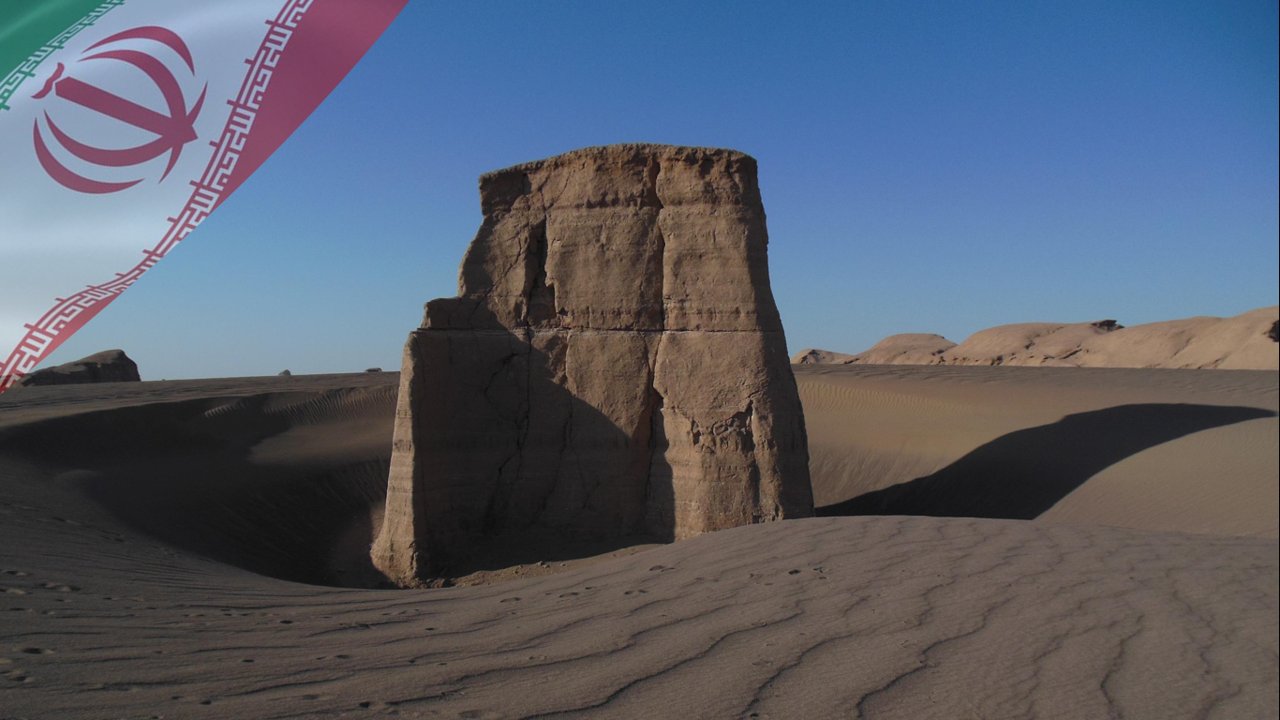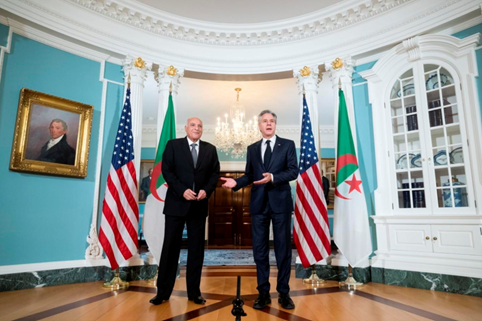Source: al-Monitor + Washington Post 16 August 08:06
Algerian Foreign Minister Aḥmad ‘Aṭṭāf warns about the devastating consequences in case a large-scale conflict breaks out in Niger.
On Tuesday Algerian Foreign Minister Aḥmad ‘Aṭṭāf confirmed that any military intervention in Niger will end in failure.
In his interview with the American al-Monitor website, ‘Aṭṭāf viewed that the solution to the crisis in Niger via a military intervention “is a very difficult choice and its success is very distant”.
‘Aṭṭāf said: There are not many countries that are supporting the military intervention as a first choice”, pointing out that the majority is in agreement that time should be given to a political and diplomatic solution.
‘Aṭṭāf warned about the devastating repercussions in case a large-scale conflict breaks out in Niger, including the possibility that the regional armed groups might exploit the lack of stability, which would lead to the loss of oil revenues for the state-owned Sonatrach company and a mass migration at the doorsteps of Algeria.
About the relations of Algeria with Russia ‘Aṭṭāf said that his country is seeking balance by “refusing to join the Western sanctions against its trusted strategic partner” at a time when it acts as the substitute natural gas provider to the European states with the aim to lower their dependence on the Russian hydrocarbons. Thus he rejected any Western criticism about the trusted relations between Algiers and Moscow.
On Tuesday Algerian Chief of Staff General as-Sa‘īd Šanqrīḥa confirmed that his country opposes the foreign military intervention in Niger, warning that it would lead to more instability in the Sahel region.
Earlier Algerian President ‘Abd al-Mağīd Tabbūn confirmed that the crisis in Niger represents “a direct threat to Algeria”, absolutely and categorically rejecting the military intervention in Niamey.
‘Aṭṭāf warns about the consequences of the military intervention in Niger
In the same context, Algerian Foreign Minister Aḥmad ‘Aṭṭāf in an interview with the American Washington Post said that discussing the crisis in Niger with the American officials reached an agreement on 3 basic principles: “respecting the constitutional and democratic system, the return of the deposed president Muḥammad Bāzūm to power, and finally giving priority to the diplomatic solution to the conflict.
‘Aṭṭāf pointed out that the situation is shifting in Niger and all parties must deal with it “not on a daily basis, but as hour by hour”. He added that there are discussions between a number of parties, like the ECOWAS and the European Union to reach the most appropriate choice while dealing with the crisis in Niger.
The Algerian Foreign Minister rejected the military intervention in Niger adding: “There is no successful example for any previous military intervention in the neighboring states”. Thus he gave Libya as an example, saying that all those who helped the foreign military intervention there left it.
‘Aṭṭāf explained that the Economic Community of the Western African States (ECOWAS) had suggested the military option in Niger only as a “last resort”, and it still gives priority to the diplomatic solution, adding that the ECOWAS may start a military intervention in Niger, but it is unknown how it would end.
The military personnel on the army of Niger had announced on 27 July through the official television the deposition of the president of the country Muḥammad Bāzūm, his house arrest at his home, the lockdown of the borders and a curfew, explaining that they “decided to limit the current regime after the security situation dwindled and there was an economic mismanagement in the county”.
Pic: American State Secretary Antony Blinken with his Algerian colleague Aḥmad ‘Aṭṭāf (archive)
وزير الخارجية الجزائري: التدخل العسكري في النيجر سينتهي بالفشل
المصدر: المونيتور + واشنطن بوست 16 آب 08:06
وزير الشؤون الخارجية الجزائري أحمد عطاف يحذر من العواقب الوخيمة في حال اندلاع نزاع واسع النطاق في النيجر
أكّد وزير الشؤون الخارجية الجزائري أحمد عطاف، أمس الثلاثاء، أنّ أيّ تدخّل عسكري في النيجر سينتهي بالفشل.
ورأى عطاف في حواره مع موقع “المونيتور” الأميركي أن حل أزمة النيجر من خلال تدخّل عسكري هو “خيارٌ صعب للغاية، ونجاحه بعيد جداً”.
وقال عطاف: “ليس هناك دول كثيرة تدعم التدخّل العسكري كخيارٍ أول”، لافتاً إلى أنّ الغالبية مُتفقة على ضرورة منح الوقت لحلٍ سياسي ودبلوماسي.
وحذّر عطاف من العواقب الوخيمة في حال اندلاع نزاع واسع النطاق في النيجر، بما في ذلك إمكانية استغلال الجماعات المسلحة الإقليمية عدم الاستقرار، ما سيؤدي إلى فقدان شركة “سوناطراك” المملوكة للدولة عائدات النفط، وإلى موجات الهجرة على أبواب الجزائر.
وعن علاقة الجزائر مع روسيا، قال عطاف إنّ بلاده سعت إلى تحقيق توازن، من خلال “رفض المشاركة في العقوبات الغربية على شريكها الاستراتيجي الوثيق”، في الوقت الذي تعمل كمورّد بديل للغاز الطبيعي إلى الدول الأوروبية بهدف تقليل اعتمادها على الهيدروكربونات الروسية، رافضاً أي انتقادات غربية بشأن العلاقات الوثيقة بين الجزائر وموسكو.
وأمس الثلاثاء، أكّد رئيس أركان الجيش الجزائري، الفريق أول السعيد شنقريحة، معارضة بلاده التدخل العسكري الأجنبي في النيجر، محذراً من أنّه سيؤدي إلى مزيد من عدم الاستقرار في منطقة الساحل.
وفي وقتٍ سابق، أكّد الرئيس الجزائري عبد المجيد تبون أنّ أزمة النيجر تُمثّل “تهديداً مباشراً للجزائر”، رافضاً رفضاً تاماً وقطعياً التدخل العسكري في نيامي.
عطاف يحذّر من تبعات التدخل العسكري في النيجر
وفي سياقٍ متصل، قال وزير الشؤون الخارجية الجزائري أحمد عطاف، في مقابلةٍ مع صحيفة “واشنطن بوست” الأميركية، إنّ مُناقشة الأزمة في النيجر مع المسؤولين الأميركيين وصلت إلى اتفاقٍ على 3 مبادئ رئيسية هي: احترام النظام الدستوري والديمقراطي، وإعادة الرئيس المخلوع محمد بازوم إلى السلطة، وأخيراً إعطاء الأولوية لحلّ النزاع دبلوماسياً.
وأشار عطاف إلى أنّ الوضع متقلّب في النيجر، ويجب أن تتعامل معه جميع الأطراف، “ليس على أساس يومي، بل على أساس كل ساعة بساعة”، مردفاً أنّ المشاورات جارية بين العديد من الأطراف مثل “إيكواس” والاتحاد الأوروبي للوصول إلى الخيار الأنسب في التعامل مع الأزمة في النيجر.
ورفض وزير الشؤون الخارجية الجزائري التدخل العسكري في النيجر، مضيفاً: “لا يوجد مثال ناجح لأيّ تدخلٍ عسكري سابق في دول الجوار”، طارحاً ليبيا مثالاً، قائلاً كل من سهّل التدخل الأجنبي فيها غادرها.
وأوضح عطاف أنّ المجموعة الاقتصادية لدول غرب أفريقيا “إيكواس”، وإن كانت قد طرحت الخيار العسكري في النيجر، إلا أنّه “الملاذ الأخير”، وهي تعطي الأولوية للحل الدبلوماسي، مضيفاً أنّ “إيكواس” من الممكن أن تبدأ تدخلاً عسكرياً في النيجر، ولكن من غير المعروف كيف سينتهي.
وكان عسكريون في جيش النيجر قد أعلنوا في 27 تموز/يوليو الماضي، عبر التلفزيون الرسمي، عزل رئيس البلاد محمد بازوم واحتجازه في مقر إقامته وإغلاق الحدود وفرض حظر التجوال، موضحين أنهم “قرروا وضع حدّ للنظام الحالي بعد تدهور الوضع الأمني وسوء الإدارة الاقتصادية في البلاد


